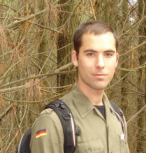DNA reveals the past and future of coral reefs
New DNA techniques are being used to understand how coral reacted to the end of the last ice age in order to better predict how they will cope with current changes to the climate. James Cook Univer

From 2005 to 2022, the main node of the ARC Centre of Excellence for Coral Reef Studies was headquartered at James Cook University in Townsville, Queensland (Australia)








Abstract: Conservation involves multiple actors. There are numerous conservation organisations, and their primary job is to mitigate or halt the degrading activities of the myriad of individuals, companies and industries that undermine conservation outcomes. These actors are all making strategic decisions, and are changing their behaviour in response to, or anticipation of, each other’s actions. By contrast, conservation theory has paid relatively little attention to these dynamics and interactions, and instead has made relatively simple assumptions about the behaviour of other actors. The theory of interactive decision making – game theory – can offer useful insights into conservation dynamics, and frame critiques of optimal organisation behaviour and structure. It can also help to refocus attention onto under-emphasised but critical aspects of conservation theory. I use two recent conservation applications of game theory to highlight the unrealised flexibility and potential of game theoretic analyses in conservation theory.
Biography: Michael Bode is a Senior Research Fellow at the University of Melbourne’s School of Botany. After an undergraduate degree at JCU, he did his PhD in the University of Queensland’s Mathematics Department, supervised by Hugh Possingham. He worked as an ARC Postdoctoral fellow at the University of Melbourne, and is currently a DECRA fellow in the same department, working as an investigator on the ARC Centre of Excellence for Environmental Decisions, and the NERP Environmental Decisions Hub. Michael’s research has focused on applications of decision theory to problems in conservation planning and applied ecology. He is also interested in the large-scale structure of coral reef fish larval dispersal networks, and the effect that larval dispersal patterns have on the dynamics of reef fish populations and communities.
New DNA techniques are being used to understand how coral reacted to the end of the last ice age in order to better predict how they will cope with current changes to the climate. James Cook Univer
A new study on the effects of climate change in five tropical countries has found fisheries are in more trouble than agriculture, and poor people are in the most danger. Distinguished Profess
James Cook University researchers have found brightly coloured fish are becoming increasingly rare as coral declines, with the phenomenon likely to get worse in the future. Christopher Hemingson, a
Researchers working with stakeholders in the Great Barrier Reef region have come up with ideas on how groups responsible for looking after the reef can operate more effectively when the next bleaching
Abstract: As marine species adapt to climate change, their heat tolerance will likely be under strong selection. Individual variation in heat tolerance and its heritability underpin the potential fo
Abstract: The Reef Ecology Lab in KAUST’s Red Sea Research Center explores many aspects of movement ecology of marine organisms, ranging from adult migrations to intergenerational larval dispersal
Abstract: Macroalgal meadows are a prominent, yet often maligned component of the tropical seascape. Our work at Ningaloo reef in WA demonstrate that canopy forming macroalgae provide habitat for ad
Abstract: Sharks are generally perceived as strong and fearsome animals. With fossils dating back at least 420 million years, sharks are not only majestic top predators but they also outlived dinosa
Abstract: Connectivity plays a vital role in many ecosystems through its effects on fundamental ecological and evolutionary processes. Its consequences for populations and metapopulations have been
Abstract: Evolution of many eukaryotic organisms is affected by interactions with microbes. Microbial symbioses can ultimately reflect host’s diet, habitat range, and even body shape. However, how
Abstract: The past few years have seen unprecedented coral bleaching and mortality on the Great Barrier Reef (GBR) but the consequences of this on biodiversity are not yet known. This talk will expl